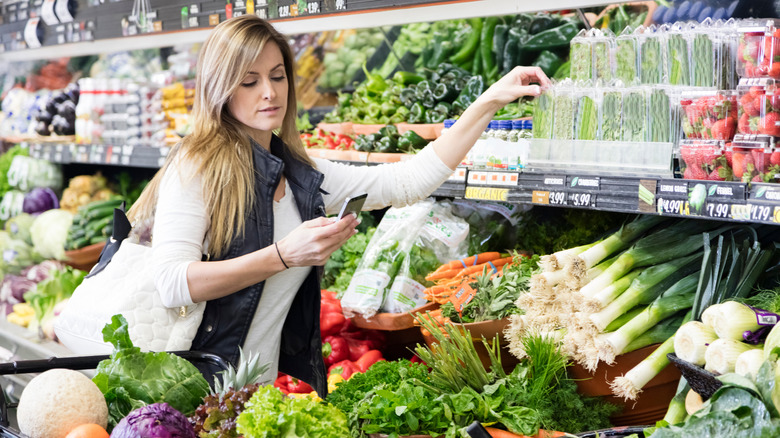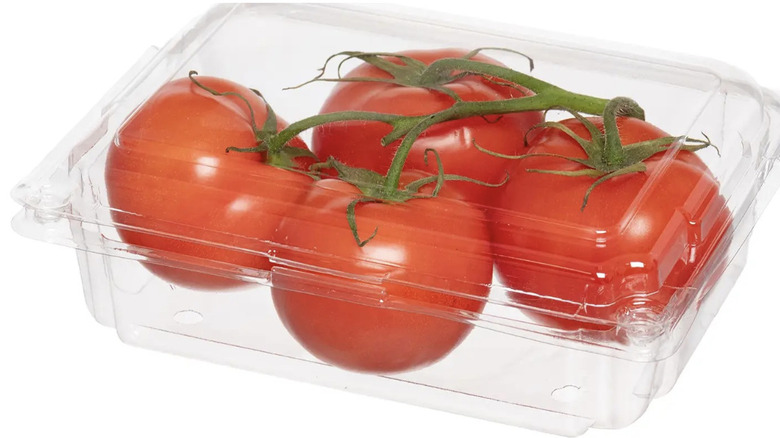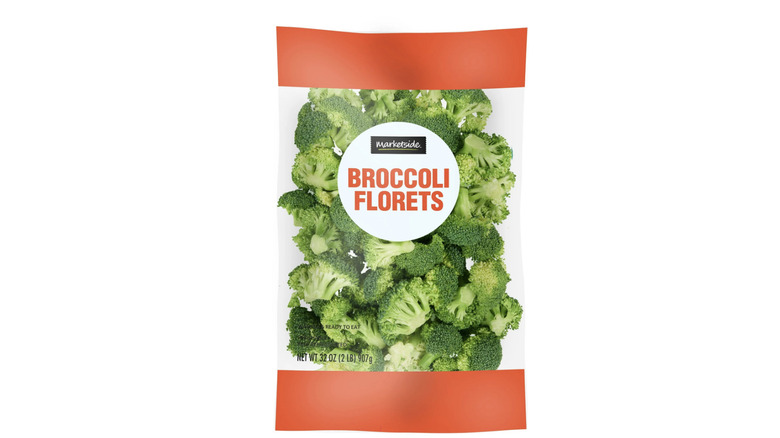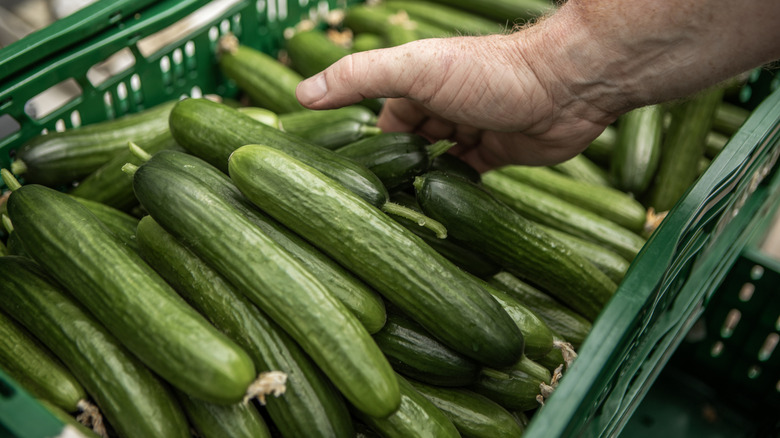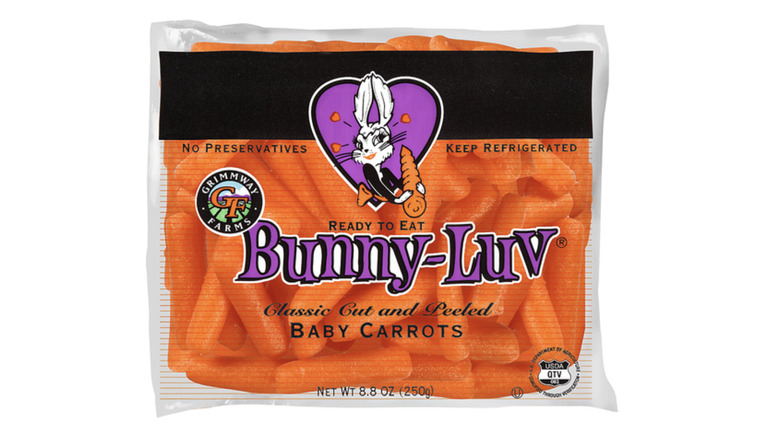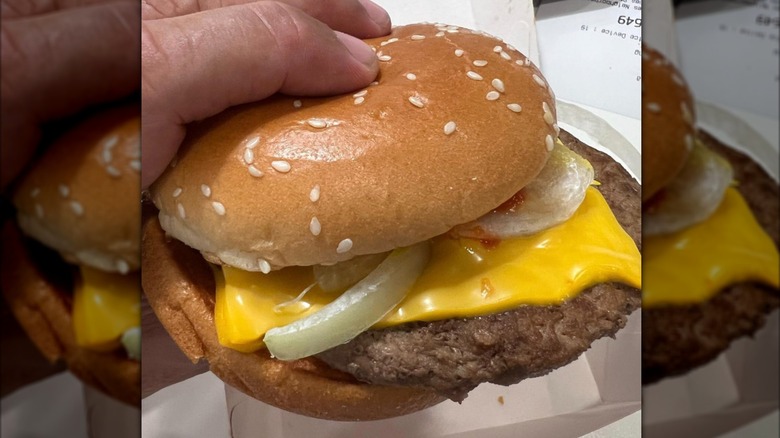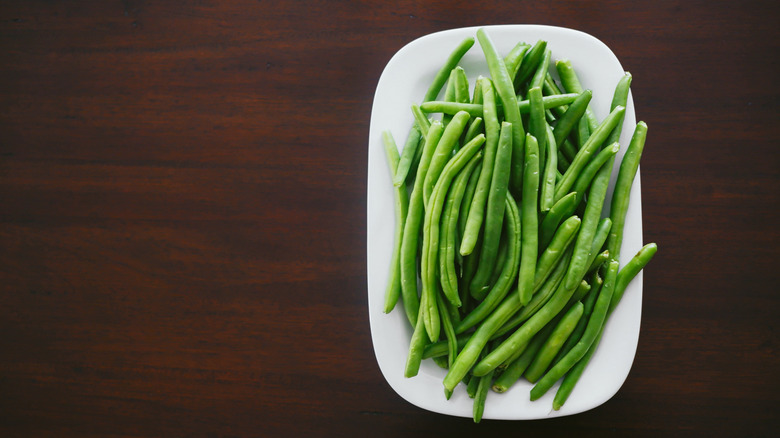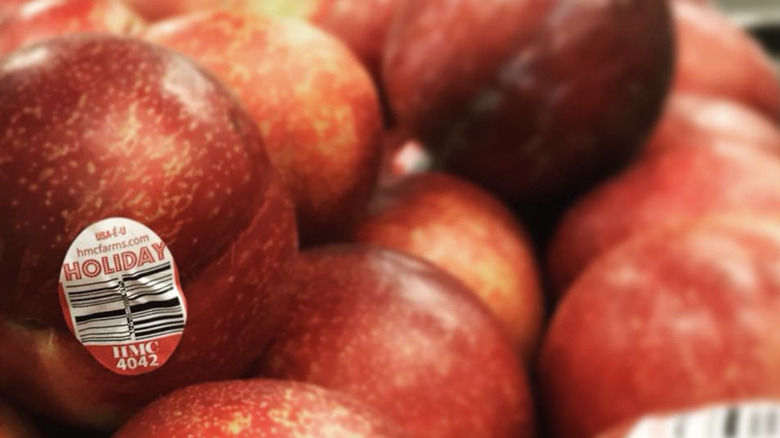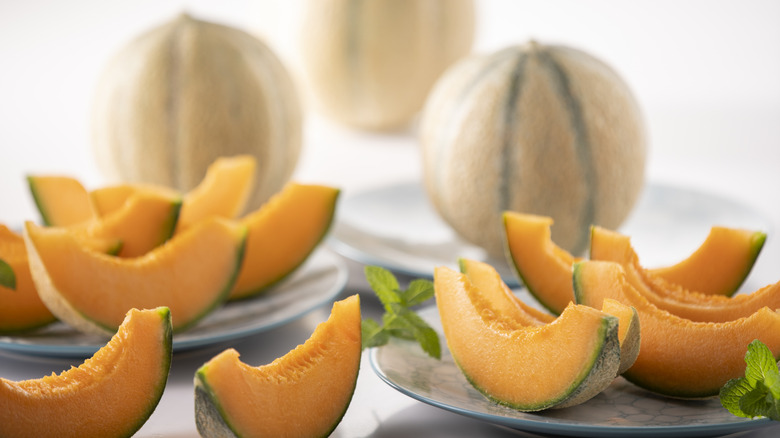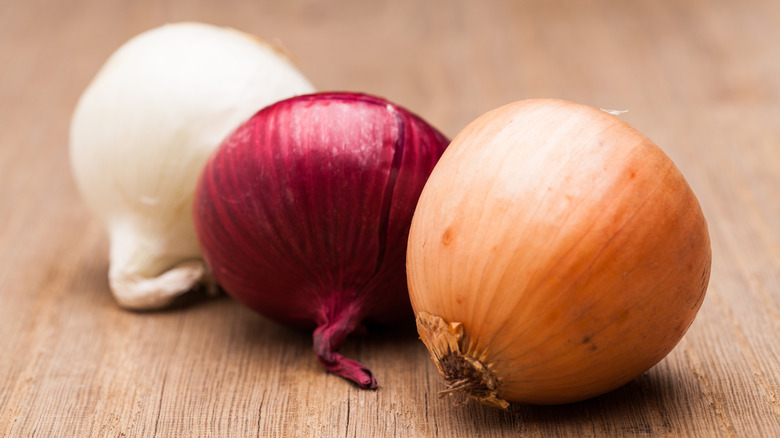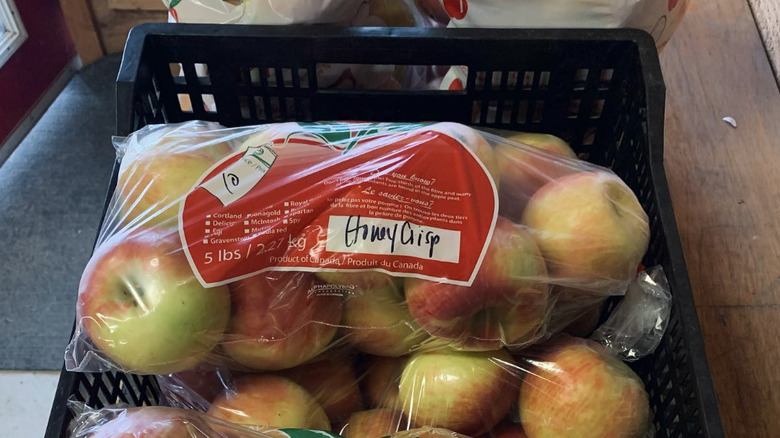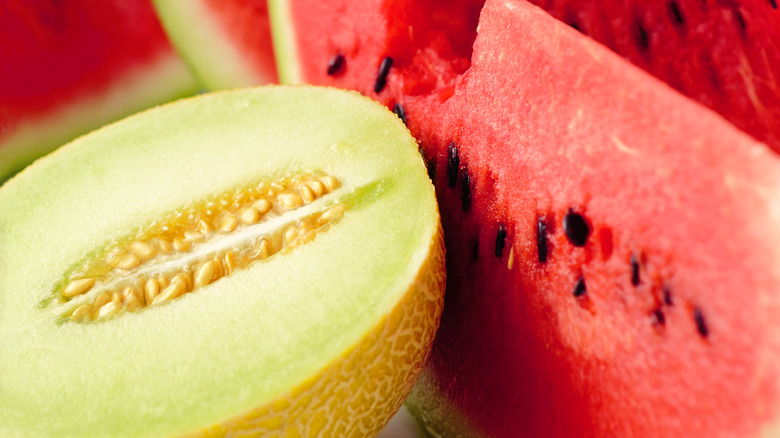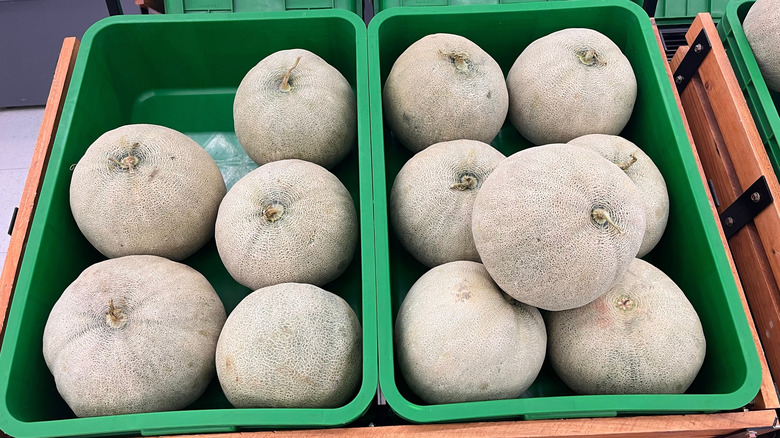Produce Recalls That Affected Millions
We may receive a commission on purchases made from links.
When buying produce at the supermarket, the last thing we expect is for it to make us sick. Be it carrots, stone fruit, or tomatoes, we tend to view fruit and vegetables as healthy and nutritious, counting on them to be both fresh and safe to eat. Sadly, even fruit and vegetables come with risks. Despite safety protocols, incidents of foodborne illnesses caused by contaminated produce happen more often than we might think.
When it comes to fruit and vegetables, common contaminants include salmonella, E. coli, and listeria monocytogenes. These pathogens can enter the supply chain at various stages of the production process, from irrigation to storage and packaging. Over the years, several serious outbreaks of foodborne illness have been linked to contaminated produce, leading to large-scale recalls. Likewise, upon finding evidence of potential contamination of produce, companies have issued precautionary recalls to prevent possible outbreaks.
Interested in finding out about the most serious produce recalls in U.S. history? Check out our deep dive into the biggest fruit and vegetable safety scares that affected the nation. Or if you're not a big fan of fruits and veggies to begin with, take a look at our roundups of the worst McDonald's recalls or chocolate recalls that affected millions.
Ray & Mascari and Williams Farms Repack recall tomatoes due to potential contamination with salmonella (2025)
Ray & Mascari specializes in repacking common tomato varieties for retailers and food-service businesses. The company promises to deliver fresh tomatoes to customers throughout the Midwest and East Coast. Unfortunately, Ray & Mascari failed to live up to its high standards on May 2 of 2025, when the company issued a recall of its vine-ripened tomatoes due to potential salmonella contamination. The fresh tomatoes had been sourced from Hanshaw & Capling Farms in Florida, where the possible salmonella contamination originated. The four-count containers of the produce had been shipped to Gordon Food Service Stores in at least 11 states.
On the same day, Williams Farms Repack — which also obtains tomatoes from Hanshaw & Capling Farms — announced a recall of this produce for the same reason. The recall involved a range of tomato products including loose produce, 25-pound boxes, three-count trays, and other bulk formats. The tomatoes had been distributed in Georgia, North Carolina, and South Carolina.
While no illnesses were linked to the consumption of the fresh tomatoes up to the time of reporting, salmonella is nothing to take lightly. While the bacteria can be particularly dangerous for young children, the elderly, and individuals with compromised immune systems, it can also lead to severe illness in healthy adults. Some of the most common symptoms of salmonella include diarrhea, nausea, vomiting, and fever.
Braga Fresh recalls broccoli over fears of listeria contamination (2024)
Braga Fresh ended 2024 on a less-than-stellar note after the company issued a voluntary recall of its Marketside Broccoli Florets due to potential listeria contamination. The washed and ready-to-eat produce was packaged in 12-ounce bags marked with a "best if used by" date of 10 December 2024. Much of the broccoli had likely already left supermarket shelves by the time the company announced the recall on December 27, so there was considerable concern that some consumers could still have the contaminated product in their freezers.
Considering that more than 35,000 bags of these Marketside Broccoli Florets had been shipped to Walmart stores in 20 states, it's somewhat surprising that no illnesses were linked to the produce at the time. The listeria bacteria — which was discovered by Texas Health and Human Services during random testing of the product — can have serious consequences, particularly for children, the elderly, and pregnant women.
While healthy adults may experience short-term symptoms like fever, nausea, diarrhea, and headaches, listeria can be life-threatening. In fact, the recall was so serious that the FDA gave it a Class I status, reserved for incidents involving "a reasonable probability that the use of, or exposure to, a violative product will cause serious adverse health consequences or death," according to the FDA.
SunFed and other distributors recall cucumbers due to a salmonella outbreak (2024)
SunFed is a supplier of fresh fruits and vegetables, offering a wide range of produce such as cucumbers, bell peppers, squash, watermelons, and tomatoes. The company prides itself on a commitment to food safety, regularly conducting internal and external audits in partnership with organizations like Primus Labs to ensure compliance with rigorous agricultural and handling standards.
Despite this proactive approach, SunFed isn't immune to food safety issues. In autumn of 2024, the company initiated a recall of its whole American cucumbers due to concerns over salmonella contamination.
The recall was announced after the FDA linked the company's cucumbers to a string of salmonella cases. At the time of reporting, 68 illnesses and 18 hospitalizations had been associated with the tainted cucumbers, which were supplied to the company by Agrotato, S.A. de C.V., a grower in Sonora, Mexico. Other distributors that sourced cucumbers from Agrotato also initiated recalls following the FDA's findings. These included Russ Davis Wholesale, Supreme Produce, and Yummi Sushi.
Grimmway Farms recalls carrots after an E. coli outbreak (2024)
Founded in the early 1960s as a roadside produce stand in Anaheim, California, Grimmway Farms has risen above its humble beginnings. Today, the company offers more than 65 types of organic crops grown in the U.S. and marketed under brands like Cal-Organic Farms and Bunny-Luv. Grimmway Farms is also a major producer of carrots.
Proving that even industry leaders can sometimes face challenges, in November of 2024, Grimmway Farms was involved in a recall of organic whole and baby carrots after the products were linked to 39 cases of E. coli, resulting in one death. The produce had been sold under a range of labels — including Whole Foods 365, Full Circle, Good & Gather, and Nature's Promise — in stores like Trader Joe's, Wegmans, and Target. The recall covered the entire U.S. (including Puerto Rico) and Canada.
The E. coli bacteria can cause serious illnesses, particularly in high-risk groups such as children and the elderly. Some of the most common symptoms of infection with this pathogen include diarrhea, cramps, fever, nausea, and vomiting. In the most severe cases, E. coli can lead to hemolytic uremic syndrome, kidney failure, brain damage, and even death.
McDonald's recalls Quarter Pounders containing infected onions (2024)
Recalls don't just affect produce found at the supermarket. They can also impact restaurants — even giant chains like McDonald's. In October of 2024, the fast food burger chain was subjected to a widespread recall after the slivered onions in its Quarter Pounders were found to be contaminated with E. coli. The tainted onions were sourced from Taylor Farms, an American producer of fresh-cut fruits and vegetables.
At least 104 people were reportedly infected with E. coli across 14 states, the majority of whom remembered eating at McDonald's before they fell ill. Unfortunately, 34 of the infected individuals required hospitalization, and four developed hemolytic uremic syndrome, which can lead to kidney failure. One death was also linked to the infected onions. In response to the outbreak, McDonald's replaced its onions with produce from a different supplier in the affected states. Additionally, the McDonald's recall inspired other fast food restaurants to pull onions from their kitchens.
The onion recall isn't the first time McDonald's has had to remove ingredients and menu items due to safety concerns. In 2018, the fast food giant had to pull salads from its lineup after they were linked to a cyclosporiasis outbreak that. Over the years, McDonald's also had to deal with several recalls of its Happy Meal toys — including a fitness tracker and Hello Kitty whistles — and Shrek-themed drinking glasses.
Wiers Farm and R.S. Hanline recall jalapeños, green peppers, and green beans due to potential contamination with listeria (2024)
Jalapeños, green peppers, and green beans are all commonly found in grocery stores across the U.S. Unfortunately, just like other produce, they are all susceptible to bacterial contamination at various stages of the supply chain. If not handled and stored correctly, they can become carriers of potentially deadly pathogens, posing serious health risks to consumers. In July of 2024, consumers were no doubt checking their refrigerators after Wiers Farm and R.S. Hanline & Company issued a recall of selected lots of their jalapeños, green peppers, and green beans.
The precautionary recall was announced due to concerns that the vegetables might have been contaminated with listeria monocytogenes, which can lead to serious illness. As far as we are aware, no illnesses had been linked to the produce at the time. That said, it's important to note that symptoms of listeria can take up to 70 days to appear after exposure to the pathogen. It remains unclear how the vegetables came into contact with the bacteria. The produce was sold at some Aldi stores in Kentucky, New York, Ohio, Pennsylvania, and West Virginia under the Freshire Farms brand.
HMC Farms recalls fresh stone fruits due to potential listeria contamination (2022 and 2023)
HMC Farms has a long history. Established in 1887 on a 40-acre property, the agricultural company has remained under the stewardship of the same family for generations. Today, HMC Farms grows fruit on more than 6,000 acres of land, supplying produce to retailers. In an unwelcome turn of events, in both 2022 and 2023, HMC Farms was forced to recall significant quantities of stone fruit — including peaches, plums, and nectarines — due to possible contamination with listeria.
The recall was announced after the HMC Farms stone fruit was identified as the likely source of 11 listeria infections, with one person in California succumbing to the illness. The contaminated fruit was sold in 2-pound bags labeled "HMC Farms" or "Signature Farms," or as loose fruit marked with a "USA-E-U" sticker. While it's unclear how the pathogen contaminated the fruit, Amy Philpott, spokesperson for HMC Farms, said at the time that the company was "working tirelessly with the FDA to investigate how the contamination happened," according to NBC News. To our knowledge, the exact source of the contamination has never been publicly disclosed. Nonetheless, don't let this incident stop you from exploring all the ways how to make the most of stone fruit season.
Sofia Produce and other distributors recall cantaloupes following a salmonella outbreak (2023)
Known for their rough skin and sweet, juicy flesh, cantaloupes are often eaten on their own or added to fruit salads. They are also a great addition to smoothies and desserts. Unfortunately, fresh fruit enthusiasts who purchased whole cantaloupes or products containing pre-cut cantaloupes in 2023 were urged to check the origin and lot numbers of their purchases, because of a cantaloupe recall due to possible salmonella contamination.
The affected cantaloupes were recalled by several distributors, including Sofia Produce, operating as Trufresh. The produce supplied by Sofia Produce was marked with several labels, including "Malichita" or "Rudy," while stickers affixed to the fruit read "4050," and "Product of Mexico/produit du Mexique." Other cantaloupes affected by the recall included those from Crown Jewels Produce — labeled "Malichita/Z Farms" — and produce supplied by Pacific Trellis. The tainted cantaloupes were shipped from Mexico to both the U.S. and Canada, with the alarm raised after the Canadian Food Inspection Agency determined that salmonella could be found on the fruit.
While many product recalls happen before anyone gets ill, this wasn't the case here. The salmonella outbreak linked to cantaloupes sickened more than 400 people in 44 states. This included 158 hospitalizations and six deaths.
Thomson International recalls onion due to potential salmonella risk (2020)
Located near Bakersfield, California, Thomson International farm has been operated by the same family for five generations. The agricultural company specializes in growing a wide range of crops, including watermelons, onions, potatoes, and carrots. In 2020, Thomson International was involved in a significant recall when its red, yellow, and white onions — as well as sweet yellow onions — were withdrawn from the market due to potential salmonella contamination.
While it's unclear how the contamination originated and whether it led to any illnesses, the tainted onions found their way to retail stores, restaurants, and wholesalers in 50 states, the District of Columbia, and Canada. The produce was sold under several brand names, including Tender Loving Care, El Competitor, Hartley's Best, Onions 52, Majestic, and Kroger, likely making it harder for consumers to identify the origin of the produce they had purchased. In addition to being sold as whole bulbs, the onions were also chopped up and used in a wide range of products. These included cheese dips and spreads, salads, stir fry blends, and kabob kits.
North Bay Produce recalls apples due to potential listeria contamination (2019)
With its headquarters in Traverse City, Michigan, North Bay Produce started out as Wilderness Fresh Produce to help local growers distribute apples, asparagus, and prune plums. Today, North Bay Produce is a grower-owned cooperative of over 30 members from across North, Central, and South America. On the North Bay Produce website, the company states that its growers "comply with food safety and security standards and handling protocols to offer safe and delicious product" — but the company faced scrutiny in October of 2019 when it recalled apples because of possible listeria contamination.
The incident saw North Bay Produce recall 2,297 cases and 2 bulk bins of fresh McIntosh, Honeycrisp, Jonathan, Fuji, Jonamac, and Red Delicious apples. The apples were marketed under three different brands, and apples sold without specific packaging labels were also included in the recall. The fruit was distributed to retailers and wholesalers in Florida, Illinois, Kentucky, Louisiana, Michigan, North Carolina, Texas, and Wisconsin. While the recall could have had serious consequences, no illnesses were linked to the consumption of the produce at the time of the incident.
Caito Foods recalls pre-cut melon products due to possible salmonella contamination (2019)
Established in the 1960s by a pair of brothers, Caito Foods is a distributor that specializes in supplying fresh produce to retailers throughout the U.S. The company's Indiana distribution center is certified by Safe Quality Foods or BRC to ensure adherence to high standards of handling and storage. Despite its longstanding commitment to food safety, Caito Foods faced significant challenges in April of 2019 when it announced a voluntary recall of its pre-cut melon products due to possible contamination with salmonella.
The extensive recall involved pre-cut watermelons, honeydew melons, cantaloupes, and all mixed fruit products that contained one of these melons, which were processed at the Caito Foods facility in Indianapolis. The freshly cut melon products were packaged in plastic clamshell containers and sold in 16 states. The produce was ultimately linked to more than 130 cases of salmonella infection in 10 different states. Luckily, the outbreak didn't result in any known fatalities, though 38 people required hospitalization due to the severity of their symptoms.
Jensen Farms recalls tainted cantaloupes after they were linked to a listeria outbreak (2011)
The Jensen Farms cantaloupe listeria case was so catastrophic that it was a factor in putting the company out of business. The company's mishandling of food safety protocols led to 146 illnesses and over 30 deaths in 28 states. In 2013, federal authorities brought criminal charges against Eric and Ryan Jensen, owners of Jensen Farms in Colorado, for their role in the incident. More specifically, the brothers were accused of "introducing adulterated food into interstate commerce," according to the United States Attorney's Office.
The brothers were accused of processing, packing, and storing the cantaloupes in a manner that posed a risk to public health. It was alleged that in May of 2011, the brothers replaced their system for cleaning cantaloupes with one specifically designed for cleaning potatoes. The system came with a catch pan for a chlorine spray, which was supposed to be used to get rid of bacteria. However, the duo were accused of never using any chlorine spray to clean the cantaloupes, leaving them susceptible to contamination. In 2014, the brothers were sentenced to five years of probation and six months of home detention after pleading guilty to misdemeanor charges.
